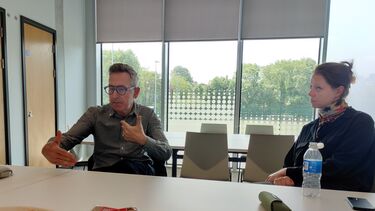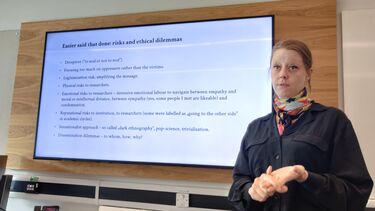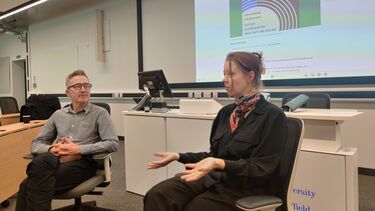Reflective blog by Palwasha Amanullah, Chandima Arambepola, Beth Porter, and Aneta Piekut (9 1√‚∑—∞Êœ¬ of Sheffield)
Anti-immigration sentiments have been mainstreamed outside openly extremist organisations, with (for example, the UK Rwanda Plan under the Conservative government, or the Polish government suspending migrants‚Äô right to apply for asylum). 9 1√‚∑—∞Êœ¬ing anti-immigration groups is extremely difficult for migration scholars; issues of can all arise. Additionally, there are political and reputational risks inherent to studying groups which oppose human rights, both for individual researchers and institutions.
Migration Research Group invited researchers from the ESRC funded project ‚Äú‚Äù (ESRC, ES/W010151/1) to learn from their recent experience. The workshop led by Dr Anna Jochymek and Dr Rafal Soborski, London Metropolitan 9 1√‚∑—∞Êœ¬ - ‚ÄúConducting emotionally and methodologically demanding research with anti-immigration groups‚Äù - offered an insightful journey into their unique challenges and learning on how to turn ‚Äòdifficult‚Äô and ‚Äòuneasy‚Äô into ‚Äòpowerful‚Äô and ‚Äòhopeful‚Äô.
The methodological
The project applied multi-sited ethnography to the study of Polish far-right political parties, social movement organisations, as well as so called , that are less established, often leaderless and as such less visible, however, still influential. The project's extensive ethnographic fieldwork created a unique qualitative data corpus comprising over 70 biographical interviews, dozens of event observations (and hundreds online), in the UK and Poland, tracing migration and radicalisation journeys. Respondents were Polish activists, British far-right leaders, members of fascist and neo-Nazi structures, and different smaller communities, such as neopagan or religious groups.
Dr Soborski noted that the far right community among Poles in the UK is intriguing for political scientists and migration scholars; most of their study participants were not interested in politics before leaving Poland, but got radicalised after the immigration. Poles in the UK are more likely to vote for far right parties. In May 2025, in the 1st round of Poland’s presidential elections, about (and in some locations it was over a half), while in Poland it was 22%.
The emotional
Dr Joachymek - who conducted most of the interviews - led the workshop part on the processual ethics applied in the project. She outlined a few principles of conducting research with far-right and anti-immigration groups: (1) full research transparency with the study participants, (2) researcher safety including public meeting rules and regular team debriefing sessions, (3) the , and (4) using positionality as an autoethnographic research navigation tool*. Chandima reflected after the workshop:
Apart from the rich empirical findings the researchers presented, their reflexivity and active framing of their positionality underscored the importance of being alert to how our perceptions can potentially "dehumanize" particular groups such as far-right activists
Workshop participant
Chandima Arambepola, CDT Borders and Bordering
Workshop participants found the day thought-provoking and transformative for thinking about how to engage in ethical and impactful research with groups we, as critical migration researchers, might fundamentally disagree with. As Beth explained:
The team’s workshop and film screening provided a fascinating and, at times, emotive insight into conducting research with far-right and anti-immigration groups. From considering how to negotiate power dynamics in these complex spaces, to thinking through the politics of dehumanisation and possibilities for enabling connection and understanding across political divides
Workshop participant
Beth Porter, CDT Borders and Bordering
The workshop was particularly valuable in deepening our understanding of the complexity of emotionally demanding research. Dr Joachymek explained meticulously the study’s emotional and dynamics, and situated ethics, which allowed for an empathy for the person, but the rejection of the ideology. Her active positionality as a woman in a male dominated community, with a particular vision of gender roles, was yet another emotional research encounter, bringing contradictory experiences of being in a position of power (through reflection and awareness of the power dynamics), yet often feeling isolated while working with such an ideologically distant group.
Palwasha related these emotional experiences to her current PhD research:
The workshop strengthened my capacity to navigate the complex and sensitive context of the Hazara community in Quetta, Pakistan, and further developed my ability to construct a nuanced, multi-dimensional analysis that accounts for intersecting social, political, and historical trajectories.
Workshop participant
Palwasha Amanullah, School of Architecture and Landscape
The hopeful
The workshop finalised with a film screening and Q&A: “That Boy: a conversation about hate and healing”. After its , Sheffield colleagues had a privilege to watch the emotional conversation between Toby Gorniak MBE, a former Roma teenage refugee who fled Poland after enduring violence from neo-Nazi skinheads, with Mirek Grzelak, a former neo-Nazi.
This film is timely. It offers invaluable insights for migration scholars by providing a unique lens into the violence from neo-Nazi skinheads and the impact of this violence on social integration, while also highlighting the urgent need for research-informed strategies to combat extremism and foster healing in an increasingly polarized world.
MRG member in the audience
Dr Gabriella Cioce, Sheffield 9 1√‚∑—∞Êœ¬ Management School
The workshop and film screening were funded by the 9 1√‚∑—∞Êœ¬ Research Ethics Committee (UREC) at the 9 1√‚∑—∞Êœ¬ of Sheffield.
* The principles and guidelines will be published shortly on this website as a resource for the migration studies community.



